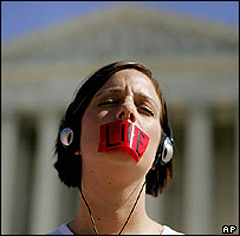 |
 |
 |
 Editorials | At Issue | February 2006 Editorials | At Issue | February 2006  
Could this be the End of Roe V Wade?
 Clare Murphy - BBC News Clare Murphy - BBC News


| | An end to Roe v Wade is the goal of the anti-abortion movement. |
The South Dakota legislators who have approved a bill all but outlawing abortions in the sparsely populated state have loftier aims - an end to the Supreme Court ruling which made terminations legal across America more than 30 years ago.

They hope to provoke pro-choice groups into launching a series of challenges to the law which will ultimately end in the nation's top court, home to two new conservative Bush appointees.

Fresh from this makeover, the court is seen as more likely than ever to overturn the landmark 1973 Roe v Wade ruling on abortion.

There are many ifs. Even if new justices John Roberts and Samuel Alito were prepared to vote against the ruling - which is far from a given - they might still be in a minority on the nine-member bench.

For some anti-abortion activists keen to see an end to Roe v Wade, the South Dakota initiative is too little, too soon - but they nonetheless remain optimistic that a fatal blow is not far off.

The possibility of its demise sparks heated debate in a country deeply divided on the issue of abortion. Yet campaigners from both camps acknowledge that its fall could in fact make very little difference to many women seeking to end their pregnancies.

Business as usual?

Were Roe v Wade to be overturned, the issue would return to the state legislatures. In some of those likely to outlaw abortion were it to fall, local laws have already rendered the 1973 ruling all but irrelevant.

In the past decade, state legislatures have passed more than 400 laws limiting access to abortion. The Alan Guttmacher Institute, a pro-choice think tank whose findings are quoted by both sides, says abortion is available only in 13% of US counties.

South Dakota, for instance, is already one of three states with only one abortion provider, joined by North Dakota and Mississippi. Many women wanting an abortion go to other states to get one.

Requirements for parental notification - in some cases involving both parents - make it harder for minors to terminate pregnancies, while mandatory waiting periods between the obligatory counselling session and the actual procedure have also been introduced in some states in the hope of preventing abortions.

Pro-choice groups argue this provision is particularly tough on poor women, who must thus take two days - often unpaid - off work. Anti-abortion groups say it gives the women time to really think the decision through, armed with the facts.

Let battle commence

But while in a post-Roe era a number of states would ban terminations outright, many would still allow them.

Liberal states such as New York and California would allow relatively unfettered access, while a handful might attach strict conditions.

But the battle would take place in state legislatures, and that, to an increasing number of pro-choicers, may be no bad thing.

It would force them to argue their case with voters at the state level, so the thinking goes, and stop them relying on unelected courts to impose their views. Abortion rights would finally have a firm, democratic foundation. Those women who currently have to travel to other states for a termination would continue to do so.

However there are many supporters of abortion rights who find this stance naive, arguing that some states which end up banning the procedure might also stop such abortion tourism.

"If states can decree that life begins at conception, they might also be able to use state custody laws to curtail the movements of pregnant women," William Baude argued in a recent New York Times editorial.

"Once Roe has been overturned, a state may be able to place an unborn child into protective custody, forbidding their mothers to take them across state lines."

Others in the pro-choice camp may reject such suggestions as alarmist, while many remain confident that the American public would not as yet countenance an end to Roe v Wade.

But in South Dakota, hopes in the anti-abortion camp are clearly running high that change across the US could be on the way. | 
 | |
 |



